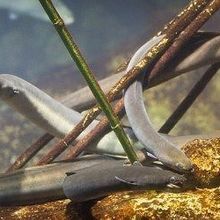Login
Subscribe404
Not Found
Is this what you were looking for?
tag sensory input ecology culture

Migratory Eels Use Magnetoreception
Kerry Grens | Apr 14, 2017 | 2 min read
In laboratory experiments that simulated oceanic conditions, the fish responded to magnetic fields, a sensory input that may aid migration.

How an Early Warning Radar Could Prevent Future Pandemics
Amos Zeeberg, Undark | Feb 27, 2023 | 8 min read
Metagenomic sequencing can help detect unknown pathogens, but its widespread use faces challenges.

Capsule Reviews
Bob Grant | Feb 1, 2015 | 3 min read
Touch, The Altruistic Brain, Is Shame Necessary?, and Future Arctic

Autism-Linked Gene SYNGAP1 Molds Synaptic Plasticity, Learning
Angie Voyles Askham, Spectrum | Oct 26, 2021 | 4 min read
The finding may help to explain why people with SYNGAP1 mutations tend to have learning difficulties and a high tolerance for pain.
Time-Lapse Proteomics
Chandra Shekhar | Mar 1, 2007 | 4 min read
Isotope labeling and mass spectrometry unite to track proteome dynamics.
African Sleeping Sickness: A Recurring Epidemic
Ricki Lewis | May 12, 2002 | 5 min read
African trypanosomiasis is making an unwelcome comeback. But unlike other returning diseases, this one has a drug treatment—eflornithine—that disappeared from the market when it failed to cure cancer. Yet like Viagra's origin from a curious side effect in a clinical trial, so too was eflornithine reborn. "When it was discovered that it removes mustaches in women, it suddenly had a market: western women with mustaches," says Morten Rostrup, president of the international council for M
So They Say
The Scientist Staff | Jul 26, 1987 | 6 min read
Verbatim excerpts from the media on the conduct of science. Frank Press On Social Science Science is not a body of facts and theories, but a way of considering problems and viewing the world. Scientists observe phenomena, develop hypotheses, conduct experiments, analyze findings and generate knowledge. They may measure gamma rays or public opinion, but the process is the same. It is this process that is science. Social scientists contribute enormously to important national issues, and all of us&